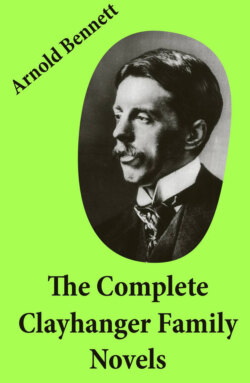Читать книгу The Complete Clayhanger Family Novels (Clayhanger + Hilda Lessways + These Twain + The Roll Call) - Arnold Bennett - Страница 162
На сайте Литреса книга снята с продажи.
Three.
ОглавлениеThe rickety building at the back of the premises, which was still the main theatre of printing activities, was empty save for Big James, the hour of seven being past. Big James was just beginning to roll his apron round his waist, in preparation for departure. This happened to be one of the habits of his advancing age. Up till a year or two previously he would have taken off his apron and left it in the workshop; but now he could not confide it to the workshop; he must carry it about him until he reached home and a place of safety for it. When he saw Edwin and a young lady appear in the doorway, he let the apron fall over his knees again. As the day was only the second of the industrial week, the apron was almost clean; and even the office towel, which hung on a roller somewhat conspicuously near the door, was not offensive. A single gas jet burned. The workshop was in the languor of repose after toil which had officially commenced at 8 a.m.
The perfection of Big James’s attitude, an attitude symbolised by the letting down of his apron, helped to put Edwin at ease in the original and difficult circumstances. “Good evening, Mr Edwin. Good evening, miss,” was all that the man actually said with his tongue, but the formality of his majestic gestures indicated in the most dignified way his recognition of a sharp difference of class and his exact comprehension of his own role in the affair. He stood waiting: he had been about to depart, but he was entirely at the disposal of the company.
“This is Mr Yarlett, our foreman,” said Edwin, and to Big James: “Miss Lessways has just come to look round.”
Hilda smiled. Big James suavely nodded his head.
“Here are some of the types,” said Edwin, because a big case was the object nearest him, and he glanced at Big James.
In a moment the foreman was explaining to Hilda, in his superb voice, the use of the composing-stick, and he accompanied the theory by a beautiful exposition of the practice; Edwin could stand aside and watch. Hilda listened and looked with an extraordinary air of sympathetic interest. And she was so serious, so adult. But it was the quality of sympathy, he thought, that was her finest, her most attractive. It was either that or her proud independence, as of a person not accustomed to bend to the will of others or to go to others for advice. He could not be sure... No! Her finest quality was her mystery. Even now, as he gazed at her comfortably, she baffled him; all her exquisite little movements and intonations baffled him. Of one thing, however, he was convinced: that she was fundamentally different from other women. There was she, and there was the rest of the sex.
For appearance’s sake he threw in short phrases now and then, to which Big James, by his mere deportment, gave the importance of the words of a master.
“I suppose you printers did something special among yourselves to celebrate the four-hundredth anniversary of the invention of printing?” said Hilda suddenly, glancing from Edwin to Big James. And Big James and Edwin glanced at one another. Neither had ever heard of the four-hundredth anniversary of the invention of printing. In a couple of seconds Big James’s downcast eye had made it clear that he regarded this portion of the episode as master’s business.
“When was that?—let me see,” Edwin foolishly blurted out.
“Oh! Some years ago. Two or three—perhaps four.”
“I’m afraid we didn’t,” said Edwin, smiling.
“Oh!” said Hilda slowly. “I think they made a great fuss of it in London.” She relented somewhat. “I don’t really know much about it. But the other day I happened to be reading the new history of printing, you know—Cranswick’s, isn’t it?”
“Oh yes!” Edwin concurred, though he had never heard of Cranswick’s new history of printing either.
He knew that he was not emerging creditably from this portion of the episode. But he did not care. The whole of his body went hot and then cold as his mind presented the simple question: “Why had she been reading the history of printing?” Could the reason be any other than her interest in himself? Or was she a prodigy among young women, who read histories of everything in addition to being passionate about verse? He said that it was ridiculous to suppose that she would read a history of printing solely from interest in himself. Nevertheless he was madly happy for a few moments, and as it were staggered with joy. He decided to read a history of printing at once.
Big James came to the end of his expositions of the craft. The stove was dying out, and the steam-boiler cold. Big James regretted that the larger machines could not be seen in action, and that the place was getting chilly. Edwin began to name various objects that were lying about, with their functions, but it was evident that the interest of the workshop was now nearly exhausted. Big James suggested that if Miss could make it convenient to call, say, on the next afternoon, she could see the large new Columbia in motion. Edwin seized the idea and beautified it. And on this he wavered towards the door, and she followed, and Big James in dignity bowed them forth to the elevated porch, and began to rewind his flowing apron once more. They pattered down the dark steps (now protected with felt roofing) and ran across six feet of exposed yard into what had once been Mrs Nixon’s holy kitchen.
